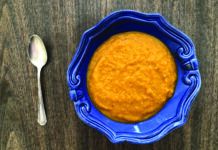Answer : There have been very few studies of the effect of added milk on the bioavailability and/or bioactivity of the antioxidants in coffee, which are called phenolics. The most recent and thorough study on this topic to date was published earlier this year in the Journal of Nutrition. As we reported, this study demonstrated that milk does not affect the bioavailability of coffee phenolics. The fact that this result is in contrast to the mixed literature on milk and tea is not particularly surprising, says Jeffrey B. Blumberg, PhD, director of Tufts HNRCA Antioxidants Research Laboratory, as tea contains quite different phenolic compounds than coffee.
While coffee contains compounds called phenolic hydroxycinnamates (particularly chlorogenic acids), teas principal antioxidant compounds are phenolic flavonoids (particularly catechins). So the binding of phenolic compounds to milk protein appears dependent on their chemical structure.
Since its the protein in milk, not the fat, that binds the phenolic compounds of tea (at least in some studies), switching to low-fat milk would be unlikely to make a difference.



















